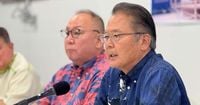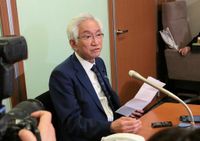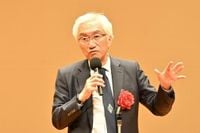On May 7, 2025, the Okinawa Prefectural Federation of the Liberal Democratic Party (LDP) announced its decision to protest against remarks made by LDP member Shoji Nishida regarding the Himeyuri Tower, a memorial dedicated to students mobilized during the Battle of Okinawa. Nishida's comments, made during a symposium in Naha City on May 3, have sparked significant backlash and concern among local officials and citizens alike.
During the symposium, which was co-sponsored by the LDP Prefectural Federation and attended by approximately 200 participants, Nishida described the historical narrative presented at the Himeyuri Tower as a "rewriting of history." He claimed that the descriptions implied that the Japanese military's presence led to the deaths of the Himeyuri Student Corps and that the subsequent American forces liberated Okinawa. Nishida emphasized, "If history is rewritten, this is what happens," indicating his belief that the current historical portrayal was misleading.
Following the uproar over his comments, Nishida held a press conference on May 7, clarifying that he did not intend to hurt the feelings of Okinawa's residents. He stated, "I had no intention of hurting the people of Okinawa. I regret that some were hurt as a result of my remarks, but the issue lies with how the media reported them." His remarks were seen as particularly insensitive given the emotional weight surrounding the Himeyuri Tower, which honors the sacrifices of students and teachers who lost their lives during the Okinawa campaign.
The Himeyuri Tower stands as a poignant reminder of the tragic events of the Battle of Okinawa, where many students from the Okinawa Normal School Women's Division and the Okinawa Prefectural First High School for Girls were mobilized into combat. The Himeyuri Peace Memorial Museum, which oversees the tower, has stated that there is no exhibition supporting Nishida's claims about the historical narrative presented at the site.
In response to Nishida's statements, the LDP Okinawa Prefectural Federation convened on May 7 to discuss the implications of his remarks. Federation Secretary-General Kazuyoshi Zaba expressed his disappointment, stating, "It is very regrettable that such statements were made regarding the historical recognition of the Battle of Okinawa. We will formally protest to the party headquarters and propose a resolution to demand the retraction of these comments."
The symposium itself was organized by an executive committee formed by the Okinawa Prefectural Main Office of the Shinto Political League and the Okinawa Prefectural Shrine Office, with the aim of discussing constitutional revision. The event's focus on constitutional matters did not diminish the impact of Nishida's historical assertions, which many attendees found deeply troubling.
While Nishida maintains that his comments reflect a genuine concern about historical accuracy, critics argue that his remarks undermine the collective memory of those who suffered during the war. Nishida, who has been a member of the Diet for several years, reiterated his view that the Japanese military acted to protect its citizens during the conflict. He stated, "Many civilians suffered in the Battle of Okinawa, but the Japanese army went to help. We must question why such wars occur."
As the controversy continues to unfold, the local community is left grappling with the implications of Nishida's statements. Many Okinawans feel that his comments not only misrepresent historical facts but also disrespect the memories of those who sacrificed their lives during the war. The Himeyuri Tower, a site of mourning and remembrance, has now become a focal point for discussions about historical narratives and their place in contemporary society.
The situation highlights the ongoing tensions surrounding historical representation in Japan, particularly regarding sensitive topics like the Pacific War and its aftermath. As discussions about history and memory persist, the LDP faces pressure to address the concerns raised by its members and the broader Okinawan community.
In conclusion, the fallout from Nishida's remarks serves as a reminder of the delicate balance between historical interpretation and collective memory. As the LDP Okinawa Prefectural Federation prepares to voice its objections to the party leadership, the community watches closely, hoping for a resolution that honors the past while fostering a respectful dialogue about history.



